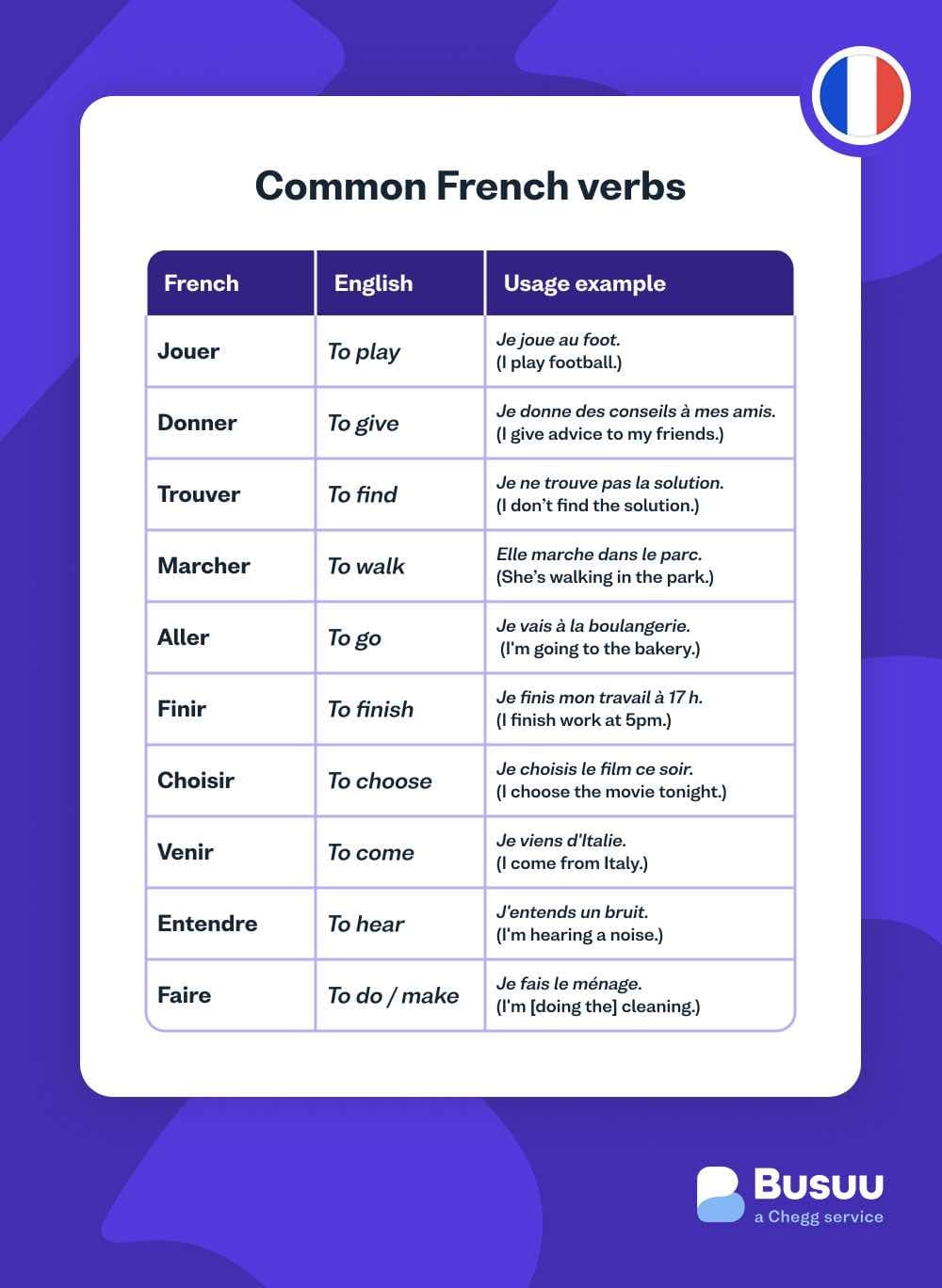I want to learn...
Learning the most common French verbs is essential for all aspiring speakers of French. Not only will it help you build a strong foundation of the language, but it can also give you more confidence when speaking with native speakers.
Imagine you’re in a chic French café and you want to order a coffee. Unfortunately, your barista doesn’t speak any English and you seem to have misplaced your phrase book. Not to worry! With this guide to verbs, you’ll know how to say: “I’d like to order a coffee, please” (or “je voudrais commander un café, s’il vous plait”).
Common verbs are essential. They appear frequently in everyday conversations and writing. Knowing them will help you communicate more effectively. They will enable you to accurately express yourself with greater precision.
So, let’s get started on learning some of the most common verbs in French. This article also covers some conjugation rules you should remember.
What are the different types of verbs in French?
Having a full understanding of the most common verbs can help you identify other verb forms and tenses that may appear less often as well. It can also help you recognize patterns in French verb conjugation, allowing you to expand your vocabulary more quickly.
In this article, we’ll look at 25 of the most common French verbs. For beginners, this is a great place to start. Getting used to regular and irregular verb rules is one way to pick them up more quickly. Discover the best way to learn French for you in our guide.
With consistent effort and practice using these verbs as a starting point, soon enough you'll be speaking fluent French!
Regular -er French verbs
These verbs follow simple rules. Just remove the -er from the end of the verb and add the right ending for your sentence subject.
There are quite a few common regular -er verbs out there, so this is a great place to start.
Jouer: To play, e. g.: Je joue au foot - I play football.
Donner: To give, e. g.: Je donne des conseils à mes amis - I give advice to my friends.
Trouver: To find, e. g.: Je ne trouve pas la solution - I don’t find the solution.
Marcher: To walk, e. g.: Elle marche dans le parc - She’s walking in the park.
Écouter: To listen, e. g.: Je dois écouter ma mère - I have to listen to my mother.
Parler: To speak/talk, e. g.: Je parle français - I speak French.
Fermer: To close, e. g.: Je ferme la porte - I close the door.
Acheter: To buy, e. g.: Je voudrais acheter un ordinateur - I’d like to buy a computer.
Appeler: To call, e. g.: J’appelle ma famille toutes les semaines – I call my family every week.

Irregular -er French verb
The irregular -er French verb “aller” doesn’t follow the same rules as other -er verbs. You’ll have to learn its conjugation separately as the stem of the word changes depending on the subject.
10. Aller: To go, e. g. Je vais à la boulangerie - I'm going to the bakery.
Regular -ir French verbs
Similarly to regular -er verbs, if you’re looking to conjugate a regular -ir French verb, just remove the ending and add the appropriate one for the subject you’re using in the sentence. Watch out, there are irregular -ir verbs too. They have their own separate rules for conjugation!
Our article on common irregular verbs in French might help if you’re looking for a more in-depth guide on conjugation.
11. Finir: To finish, e. g. Je finis mon travail à 17 h - I finish work at 5pm.
12. Choisir: To choose, e.g. Je choisis le film ce soir - I choose the movie tonight
13. Remplir: To fill, e. g. Il remplit la bouteille avec de l'eau – He’s filling the bottle with water.
Irregular -ir verbs in French
These -ir verbs are part of the large family of irregular verbs. Those are called “third group verbs”. They have their own rules for conjugation. They require a little more practice to remember, as the word might change a lot compared to regular -ir conjugations. This doesn’t mean that irregular -ir French verbs aren’t commonly used.
Here are some examples:
14. Venir: To come, e. g.: Je viens d'Italie - I come from Italy.
15. Courir: To run, e. g.: Il court autour du lac – He’s running around the lake.
16. Écrire: To write, e.g.: J’écris une lettre – I’m writing a letter.
Regular -re verbs in French
The verbs ending in -re are not considered regular. But, some of them follow the same general rule as other regular verbs. This is done by taking off the -re suffix and adding the correct one for the subject. When using the il and elle versions of these -re verbs, you don’t need to add an ending.
17. Entendre: To hear, e. g.: J'entends un bruit - I'm hearing a noise.
18. Descendre: To descend/go down, e. g.: Il descend l’escalier - He goes down the stairs.
19. Vendre: To sell, e. g.: Je vends des gâteaux - I sell cakes.
20. Perdre: To lose, e. g.: Je perds le jeu - I lose the game.
Some useful irregular French verbs
Many very common verbs tend to be irregular. Knowing them will help you to communicate in French. Remember when you wanted to order a coffee? Well, the verb “vouloir” (in the more polite conditional form in our example, “Je voudrais commander un café”) is one of those very useful verbs.
21. Faire: To do/make, e. g.: Je fais le ménage - I'm [doing the] cleaning.
22. Vouloir: To be willing to/want, e. g.: Je veux travailler en France - I want to work in France.
23. Devoir: To have to/must, e. g.: Je dois finir cette tâche - I have to finish this task.
24. Dire: To say/tell, e. g.: Je dis que je viens - I say I am coming.
25. Savoir: To be able to/know, e. g.: Je sais cuisiner - I can cook.
How many can you remember?
Learning French can be intimidating, but with the right strategies and practice, you'll be fluent in no time. Reviewing these 25 most common verbs will get you off to a great start. It will help build your confidence when talking to native speakers.
Practice regularly and you'll be able to start conversations with ease. Bonne chance! — Good luck!
To take your French to the next level, check out Busuu’s online French courses today. They are designed by experts and supported by our community of native speakers and so much more.
Newlanguages


